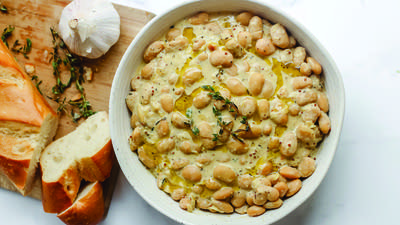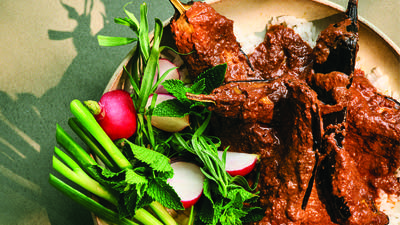
Every year, millions of women make a grand pilgrimage, traveling from all parts of India to the city of Kerala for an amazing display of devotion to the goddess Attukal Amma. At the center of their offering is a pot of sweetened rice, tens of thousands of which are cooked simultaneously during the massive gathering. Writer Leslie Pariseau went to Kerala to witness this astonishing event for SAVEUR magazine; she shares her experience with Managing Producer Sally Swift. For more details of the pilgrimage, read Pariseaus's full-length article.
Sally Swift: I'm dying to hear the story about this pilgrimage to India, but first I want you to tell me a little bit about Kerala and that area of India.
Leslie Pariseau: Kerala is a beautiful place. It's on the southwestern coast, near the tip of India. It's tropical and humid, there are beach towns, and this time of year it's very hot.
 THE SACRED JOURNEY OF FOUR MILLION INDIAN WOMEN TO COOK FOR THEIR GODDESS: Once a year, millions of women leave their homes around Kerala to give a sweet offering of rice for their goddess, Attukal Amma.
Photo: Michelle Heimerman/SAVEUR
THE SACRED JOURNEY OF FOUR MILLION INDIAN WOMEN TO COOK FOR THEIR GODDESS: Once a year, millions of women leave their homes around Kerala to give a sweet offering of rice for their goddess, Attukal Amma.
Photo: Michelle Heimerman/SAVEUR
SS: Tell me about this pilgrimage. What are these women doing?
LP: It's a pilgrimage where millions of women travel to one city to cook a dish together. It's about devotion to one goddess; they're traveling to the home of this goddess and her temple in a city called Trivandrum. Starting a few days ahead of time, the trains are filled with women who are all going to this place. The fares are suspended for women who are going, so they have a free ride. The women usually take with them a single bag filled with all of the ingredients they need to cook what is called pongala. The entire ceremony revolves around arriving to the temple and setting up makeshift hearth of three bricks, a clay pot, and coconut bark for firewood. They set these up all over the city. The city provides the bricks for the hearths, and sometimes the pots.
SS: How many women are you talking?
LP: It's been about a million or two million.
SS: Wow!
LP: Yes. It's hard to hold in your mind what one or two million women look like. This year, the temple reported that it was close to four million women.
 Women of all ages and socioeconomic backgrounds travel to worship Attakul Amma.
Photo: Michelle Heimerman
Women of all ages and socioeconomic backgrounds travel to worship Attakul Amma.
Photo: Michelle Heimerman
SS: They are all going to a single temple that's devoted to a goddess. Correct?
LP: The way that they refer to her is Attukal Amma. She is sometimes conflated with another goddess and there's such mythology around all this. She's an incarnation of a female deity usually known as Bhadrakali. She's worshipped locally by these women; she's seen as a giving figure, but also a very intense, strong, and sometimes furious figure.
 Leslie Pariseau | Read full SAVEUR article
Photo: Dylan + Jeni
Leslie Pariseau | Read full SAVEUR article
Photo: Dylan + Jeni
SS: Set the scene for me. You are there and millions of women are setting up makeshift hearths with the bricks. They are going to cook simultaneously, which is an amazing thought. Tell me about what they're cooking.
LP: On the morning that this happens, women wake up very early to prepare themselves. They wash their hair. They wash the rice. They often dress in new clothing; I was told that women often bring a new outfit just for this ceremony. Then they all gather around the hearths that they've made and wait for the signal from the temple. That signal is when the priest in the temple lights a fire, and the fire gets passed from woman to woman. There are also volunteers running around helping to light hearths. So, all at once – at the same exact moment all around the city – there are speakers set up, women light a fire, and they all start cooking.
What's incredible about this is the smell. You're walking around the city, and all of this smoke is all over the place; everything smells like burnt rice, fire, and coconut bark. It’s 97 degrees, these women are sweating, there's smoke in their eyes, and they're all praying. They're looking at their pots, and looking at the sky, all in the same act of devotion at the same exact moment.
 In the days leading up to the Pongala ceremony, pilgrims set up brick hearts and altars in whatever public space is available to them—across sidewalks, in streets, over medians—and wait.
Photo: Michelle Heimerman/SAVEUR
In the days leading up to the Pongala ceremony, pilgrims set up brick hearts and altars in whatever public space is available to them—across sidewalks, in streets, over medians—and wait.
Photo: Michelle Heimerman/SAVEUR
SS: They’re cooking a rice porridge?
LP: Yes. To start off, they have a clay pot over an open fire. They add water and wait for it to boil. They have this specific kind of red rice; it has a partial husk left on so it has a red hue. They scatter rice into the pot, usually in three handfuls. Then they wait for the pot to boil. Part of the ceremony is that the pot must boil over to satisfy the goddess. When you look around, all of these pots are bubbling over with the steamy beginnings of a rice porridge.
SS: And they eat it then?
LP: They do. They spend time cooking it so that the rice gets soft like any rice dish would. At the end, they add seasonings and sweet flavors. It depends on where the women are from. Some women say that you have to add ghee because it’s a purifying sort of symbol. Many women add ginger. There's always coconut, cardamom, and jaggery, which is an unrefined palm sugar.
Once it is cooked, they cover the pot with a banana leaf and wait for a priest to come around – this could take hours. In this interim time, they eat lunch, they sit around and rub each other’s shoulders, they nap. When the priest comes, they all get behind their hearths again. They take off the banana leaf, and the priest scatters holy water over their pots. Then they're free to eat it. This moment is so beautiful because it's the thing they've been waiting for all year, this symbol of feeding themselves, feeding the gods, feeding their families. They all take a spoonful, they taste each other’s pangola, they feed each other. Then they put the banana leaf back over top, they pack the pots away, and they leave.
 Pots of rice come to a boil over fires made of coconut bark near the temple that honors the goddess Attukal Amma.
Photo: Michelle Heimerman/SAVEUR
Pots of rice come to a boil over fires made of coconut bark near the temple that honors the goddess Attukal Amma.
Photo: Michelle Heimerman/SAVEUR
SS: Such a beautiful story. And I love that it's all around this bowl of rice, the food that feeds the world. One of the things you wrote about in the article was this shadowy nature of men during this festival; men stand back and let the women lead.
LP: They do. It was interesting to watch this because - from what I observed - there was almost a role reversal happening. Men are there to help. They're there to assist these women with anything that they need – from carrying a bag to literally feeding them. The entire time that the women are preparing themselves and putting together their hearths, there were tents all over the city with men who were sitting together, shucking beans, and cooking rice. They were getting ready for the moment that the women were finished; they were getting ready to feed the women. Often the women are fasting, so by the time the ceremony is over, they're very hungry. Men are there to support the women in this pilgrimage – in this act of devotion – because they're also benefitting. This is a way of showing their own devotion to the goddess and being able to take care of the women who take care of them.
SS: Go goddesses!
LP: Yes!
 Coming together in their devotion, men support the women cooks mentally and physically during the pilgrimage.
Photo: Michelle Heimerman/SAVEUR
Coming together in their devotion, men support the women cooks mentally and physically during the pilgrimage.
Photo: Michelle Heimerman/SAVEUR
Before you go...
Each week, The Splendid Table brings you stories that expand your world view, inspire you to try something new, and show how food connects us all. We rely on your generous support. For as little as $5 a month, you can have a lasting impact on The Splendid Table. And, when you donate, you’ll join a community of like-minded individuals who love good food, good conversation, and kitchen companionship. Show your love for The Splendid Table with a gift today.
Thank you for your support.
Donate today for as little as $5.00 a month. Your gift only takes a few minutes and has a lasting impact on The Splendid Table and you'll be welcomed into The Splendid Table Co-op.




